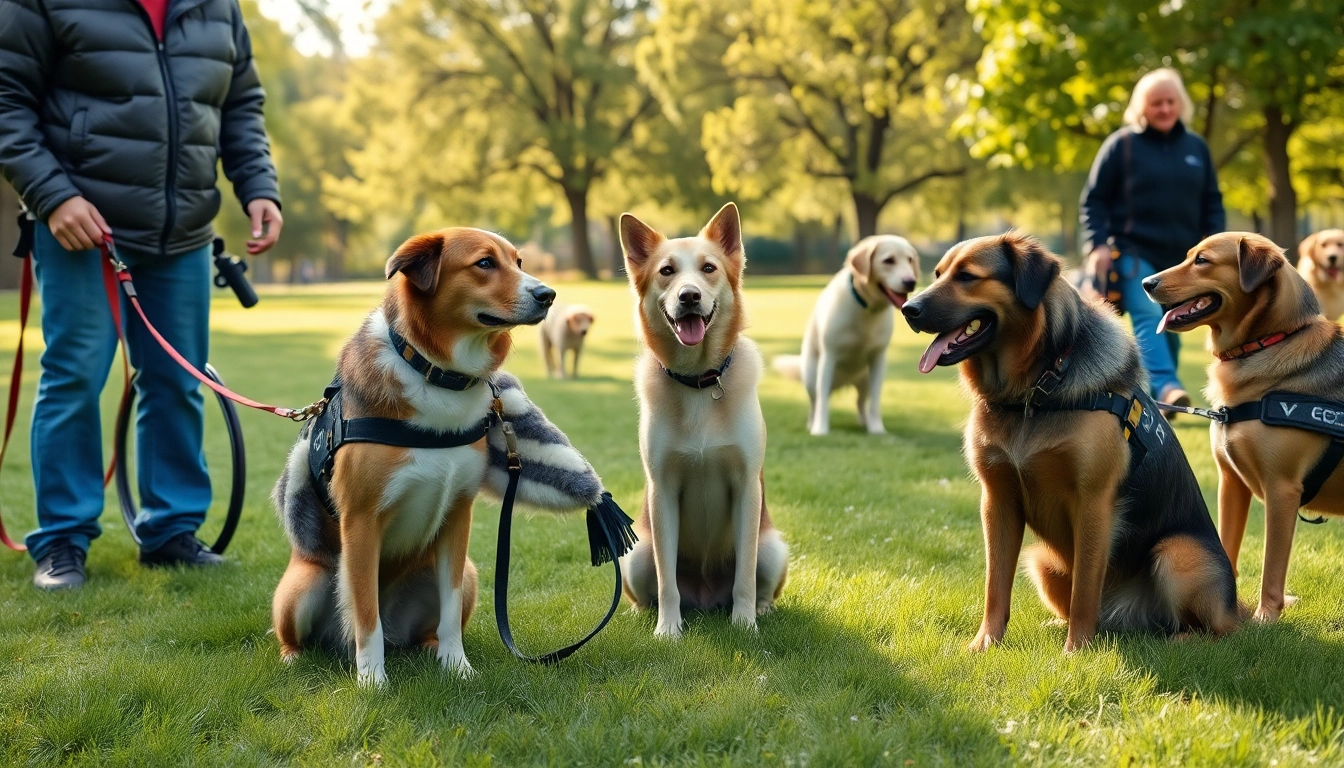Understanding Service Dogs for Sale
Service dogs play an essential role in the lives of individuals with disabilities, providing support, assistance, and companionship. For those seeking to obtain a service dog, it is crucial to understand what constitutes a service dog, the types available, and how to identify credible providers when exploring options for service dogs for sale.
What Makes a Dog a Service Dog?
A service dog is specifically trained to perform tasks that mitigate an individual’s disability, whether physical or mental. Unlike therapy or emotional support dogs, service dogs have legally defined roles under the Americans with Disabilities Act (ADA). They assist people with disabilities such as mobility challenges, hearing or vision impairments, psychiatric conditions, and more.
The key qualifications of a service dog include:
- Task-Oriented Training: Service dogs are trained to perform specific tasks such as leading individuals with vision impairments, retrieving medications, or alerting to panic attacks.
- Public Access: Service dogs are allowed to accompany their handlers in public places where pets are not permitted, such as restaurants, hotels, and airplanes.
- Behavior Standards: Service dogs must exhibit calm and controlled behavior in a variety of environments, as they interact with the public and navigate busy settings.
Types of Service Dogs Available for Sale
Various types of service dogs cater to the specific needs of different individuals. Here are some of the most common types available:
- Mobility Assistance Dogs: These dogs help individuals with physical disabilities navigate their environment. They may assist with tasks such as retrieving items, opening doors, and providing stability.
- Guide Dogs: Trained to help individuals with visual impairments, guide dogs help their handlers navigate obstacles and safely cross streets.
- Hearing Assistance Dogs: These dogs alert individuals to sounds such as alarms, doorbells, and other important cues that might otherwise go unnoticed.
- Psychiatric Service Dogs: These dogs are trained to assist individuals with mental health issues, such as PTSD, anxiety disorders, and depression. They may provide grounding, remind owners to take medication, and offer emotional grounding.
- Medical Alert Dogs: Trained to detect medical conditions such as seizures, low blood sugar, or allergic reactions, these dogs alert their handlers or find help when needed.
Identifying Qualified Providers for Service Dogs for Sale
Choosing a reputable provider is critical when looking for service dogs for sale. The following criteria can help you determine the credibility of a service dog provider:
- Accreditation: Look for organizations accredited by recognized associations such as Assistance Dogs International (ADI) or International Association of Assistance Dog Partners (IAADP).
- Training Programs: Qualified providers should offer transparency regarding their training methods and programs, ensuring they comply with best practices in dog training and handler instruction.
- Reputation: Research reviews and testimonials from past clients. Reliable providers will have a positive reputation, demonstrated through successful matches between dogs and handlers.
- Support Services: Look for organizations that offer continued support post-placement, including training refreshers and handler education.
The Benefits of Owning a Service Dog
Investing in a service dog brings profound benefits, significantly improving the quality of life for many individuals. Understanding these benefits can help potential owners make informed decisions.
Improving Quality of Life with a Service Dog
Service dogs can dramatically enhance the quality of life for their handlers. The following factors contribute to this positive change:
- Independence: Service dogs empower individuals to regain a sense of independence in everyday life. By handling specific tasks, they enable people to engage in activities they may have found challenging before.
- Emotional Support: The companionship provided by service dogs offers emotional security and comfort, reducing feelings of anxiety, loneliness, or depression.
- Increased Safety: Many service dogs are trained to alert handlers to potential dangers; for instance, a medical alert dog can signal the onset of a seizure, facilitating timely intervention.
Service Dogs for Sale: Skills and Training
Each service dog is thoroughly trained to perform essential tasks specific to individual needs. This training often includes:
- Basic Obedience: Every service dog must master fundamental commands such as sit, stay, come, and heel, ensuring they remain controllable in various environments.
- Specialized Task Training: Dogs are trained to perform tasks that directly benefit their handlers, tailored to the unique requirements of the individual.
- Public Access Training: Service dogs must learn to behave appropriately in public settings, which includes being calm around other people and animals, ignoring distractions, and adhering to commands.
Legal Protections for Service Dogs
Understanding the legal protections for service dogs is crucial for owners and those considering purchasing a service dog. The following regulations apply:
- ADA Compliance: Under the Americans with Disabilities Act, service dogs are permitted in public areas, providing they are trained to assist individuals with specific disabilities.
- No Additional Fees: Businesses cannot charge extra fees or impose restrictions on service dogs; they must treat service animals like any other necessary aid.
- Documentation Requirements: There are no formal identification or registration requirements for service dogs under the ADA, which distinguishes them from therapy or emotional support animals.
Choosing the Right Service Dog for You
Finding the right service dog tailored to your needs can be a thoughtful and measured process. Here are essential considerations that can guide the selection process:
Assessing Your Specific Needs
Before beginning your search for a service dog, it’s essential to evaluate your specific requirements carefully:
- Type of Disability: Consider how your disability affects your daily life and what tasks you require assistance with. Identifying your needs will guide the search for a suitable service dog.
- Living Environment: Consider the suitability of your home and lifestyle for a service dog. Various needs may require a large living space versus an apartment.
- Personal Preferences: Some individuals might have breed preferences or may feel more comfortable with a specific size or energy level in a dog.
Evaluating the Temperament of Service Dogs for Sale
The temperament of a dog is critical in determining if they will succeed as a service dog. When evaluating potential candidates, consider the following:
- Calmness: Service dogs must exhibit a calm demeanor, especially in public settings where distractions are prevalent.
- Socialization: A service dog should be well-socialized and capable of interacting peacefully with strangers and other animals.
- Trainability: Look for dogs with a high degree of eagerness to learn, as this will significantly impact their ability to respond to training commands.
Questions to Ask Before Buying a Service Dog
Before making a purchase, it’s crucial to ask specific questions to the provider to ensure you are making an informed decision:
- What training methods do you use, and are they evidence-based?
- Can I meet the dog and observe their behavior?
- What ongoing support and resources do you provide after placement?
- What policies do you have regarding health screenings and veterinary care?
Training and Socialization for Service Dogs
The training process is vital to ensure that service dogs are effective at assisting their handlers. Understanding the features of a good training program is essential for prospective dog owners.
Essential Training Program Features
A reliable training program for service dogs should include comprehensive features such as:
- Customized Training: Programs should cater to the specific requirements of different disabilities, ensuring that the training aligns with the unique skills needed.
- Positive Reinforcement: Utilizing positive reinforcement methods helps build a strong bond between the handler and the service dog, leading to quicker and more effective learning.
- Hands-on Training for Handlers: Training should include sessions specifically designed for handlers, focusing on how to effectively manage and work with their service dogs.
Socialization Techniques for Service Dogs
Proper socialization is integral to a service dog’s development. Effective techniques include:
- Varied Environments: Expose the dog to different locations, people, and sounds to help them adapt to various stimuli.
- Positive Experiences: Encourage positive interactions with other dogs and people to reduce anxiety and enhance social behavior.
- Routine Exposure: Consistent exposure to common environments, such as stores and public transit, helps acclimate service dogs to the demands of daily life.
Continuing Education for Service Dogs and Handlers
Just like humans, service dogs benefit from ongoing training. Continued education opportunities include:
- Advanced Training Courses: Handlers can engage their dogs in advanced training that builds on foundational skills and introduces new tasks.
- Handler Workshops: Workshops that focus on handler skills help owners understand how to handle various real-world scenarios.
- Regular Assessments: Conducting periodic evaluations to ensure the dog maintains their skills and adapts as needed.
Resources and Support for Service Dog Owners
Support networks can play a vital role in helping service dog owners thrive. Here are some resources that can assist owners throughout their journey:
Building a Support Network
Connecting with others in the service dog community can provide invaluable support. This can include:
- Support Groups: Join local or online support groups for service dog owners to share experiences, challenges, and triumphs.
- Training Clubs: Participate in clubs that focus on training and socialization activities while fostering friendships with other owners.
- Webinars and Workshops: Engage in educational opportunities to learn more about training techniques, legal rights, and healthcare resources.
Accessing Financial Assistance for Service Dogs for Sale
The financial commitment of obtaining and training a service dog can be significant. Various resources can help offset costs:
- Grants and Scholarships: Investigate programs that offer financial aid or scholarships specifically for service dog training.
- Fundraising: Consider launching fundraising campaigns through online platforms or community events to gather financial support.
- Insurance Options: Some insurance plans may cover specific services related to the care or support provided by service dogs; check with your insurance provider.
Ongoing Training and Health Care Resources
Ensuring the health and continued training of service dogs is essential:
- Regular Veterinary Care: Schedule routine check-ups to monitor health and address any concerns promptly.
- Behavioral Assessments: Keep an eye on any behavioral changes; regular assessments can help address issues before they escalate.
- Continued Training Classes: Engage in refresher courses to ensure dogs retain their training and integrate new skills effectively.



